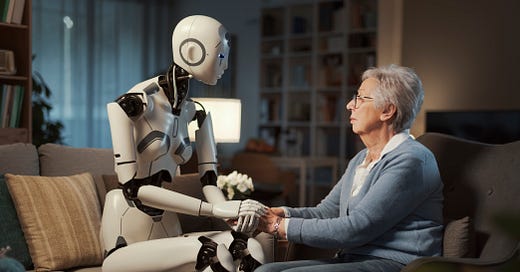Catching up with my February/March Wired magazine I started reading with interest the article “My Parents’ Dementia Felt Like the End of Joy. Then Came the Robots”, which in the paper copy had the alluring title given as the subject of this post.
What really garnered my attention was the opening of the eighth paragraph:
[T]he roboticists I learned about are trained in anthropology, psychology, design, and other human-centric fields. They partner with people with dementia, who do not want robots to solve the alleged problem of being old. They want technology for joy and for flourishing, even as they near the end of life.
What a wonderful ambition that is! And a transformative one as well. In my post “Healthy, Wealthy, Wise, and. . . . (Part Two)” I wrote about the fourth sphere of transformations – purpose & meaning, following from health & wellbeing, wealth & prosperity, and wisdom & understanding in Part One – and how all four came together to contribute to human flourishing. Helping humanity in general and individual human beings in particular flourish in this life is, again, the purpose of business.
Helping humanity flourish in this life is, again, the purpose of business.
And often it takes technology to do that. I’ve had many conversations with people over the years about senior-care robots, which are particularly prevalent in Japan because, one, the culture in general relishes the idea of robots and, two, senior care workers are scarce because of its low birth rate, lack of significant immigration, and how long people live there, extending greatly the years during which elders need care.
People often decry having some care of seniors, often vulnerable or with dementia, performed by such robots as the PARO therapeutic seal, which reacts to such actions as stroking and cuddling to reduce stress of seniors. And, yes, it would be so much better if such robots weren’t needed, if there were always human beings there who passionately care for their loved one, or at least caregivers who are paid to patiently care for them. But that is not always the case, and such robots and other technologies, if they work, are better than nothing. Often much better than nothing. Such encounters may be meaningful, and even transporting.
Yes, it would be so much better if robots weren’t needed. But. . . .
But there is a difference between merely caring for (in this sense) and helping people flourish. Now flourishing – that can be transformative.
Kat McGowan, the author of the Wired piece, wrote it because she was going through both of her parents having dementia, and
vowed to help them live their remaining years with joy and meaning. That’s not so much a matter of medicine as it is a concern of the heart and spirit. I couldn’t figure this part out on my own, and everyone I talked to thought it was a weird thing to worry about.
“Until”, that is, she “found the robot-makers.” That is the case with so many transformations, where people cannot figure out how to do it on their own – for themselves or for beneficiaries such as McGowan’s parents – and therein lies the opportunity for companies who can help guide transformations in such cases.
Even if sometimes it requires a robot.
_______________
Do read the article if you’d like to learn more about the robot-makers who are “developing a robot to bring more meaning into life”, “creating warm technology to enhance human connection”, and using robots to “explore ikigai, a Japanese word that roughly translates to a reason for living or sense of meaning in life, but also includes a feeling of social purpose and everyday joy.”
Joe Pine
© 2024 B. Joseph Pine II





